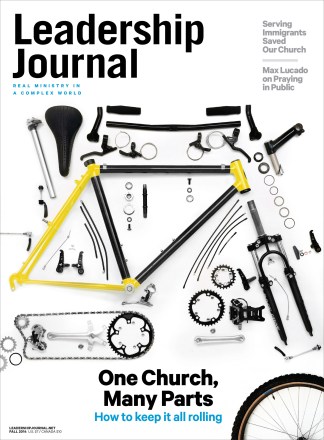Picture yourself at your next gathering of church leaders. As an icebreaker, the emcee asks everyone to turn to a neighbor and say what's going well in your ministry. With a smile, you turn to the person next to you and describe your excitement over the people from the neighborhood who've started attending the church.
Then the emcee says, "Now tell the person next to you what's keeping you up at night."
What would you say?
What would you think if your neighbor turned to you and said, "Nothing. I've got no worries"?
In a roomful of leaders, that would be pretty weird. We're not sure we'd believe such an answer.
Worry is everywhere. As I wrote in my book Anxious, "If you aren't worried, you are either (1) dead, (2) comatose, or (3) seriously out of step with our culture." The majority of Americans say they live under moderate to high stress levels. This constant stress has many consequences for our health, including high blood pressure, obesity, sleeplessness, fatigue, headaches, depression, and digestion problems.
The American Psychological Association indicates that more than half of Americans report stress-related health problems. In a 2010 survey, 40 percent of people said that in the past month, stress had caused them to overeat or eat unhealthy foods. Nearly one-third said they had skipped a meal because of stress, and more than 25 percent said they had been unable to sleep.
Worry is not only common—it's expected. As long as worry doesn't become "excessive" (a term with no clear definition) or interfere with productivity and social sparkle, it's widely considered a healthy sign of life and an indicator of engagement. After all, important and hard-working people have a lot to worry about. The good parents are the ones who care enough to worry over their kids. People who take life seriously are easily recognizable for their furrowed brows. Worry is fashionable, and we are suspicious of people who don't worry.
Leaders are certainly affected by this. We feel the weight of the world (or at least part of it) on our shoulders. We believe the hype about our own responsibilities. And we admit that we worry that if we don't seem worried, people will think we're not taking our job seriously. Or we're not doing anything important. Or we've lost our edge or our motivation or we just don't care.
But Christians, even Christian leaders, are called to live differently. In the Sermon on the Mount, Jesus told his listeners not to worry but to focus on God's priorities and trust God to provide what they needed: "Don't worry about tomorrow, for tomorrow will bring its own worries. Today's trouble is enough for today" (Matt. 6:34). When he sent his disciples forth to do ministry (Matt. 10), he told them four times not to worry or be afraid. During his Last Supper before his trial and crucifixion (John 14), he twice told them not to be "troubled," using a word that is also translated elsewhere as "worried."
Paul wrote, "Don't worry about anything; instead, pray about everything" (Phil. 4:6-7). Peter instructed Christians to "give all your worries and cares to God, for he cares about you" (1 Peter 5:7). The fruit of the Spirit (Gal. 5:22-23) describes a life in direct contrast to what worry produces.
Like other Christians, leaders are supposed to be people of peace, trust, faith, and joy. So why all the worry?
There are at least three big reasons we succumb to worry.
1. Our world is full of reasons to worry. Let's face it: there's a lot to worry about. From a purely human point of view, there are only two really good reasons not to worry: (1) it's bad for us and (2) it doesn't do any good. Those two reasons usually crumble under the avalanche of bad news that comes our way each day (each hour!). Never have we had more exposure to what is wrong with the human race and to the brokenness of our world.
In such a world, it makes perfect sense to worry—to be consumed by worry … unless a great, powerful, loving God is in control. Unless someone much wiser than us, unflustered and unthreatened, asks us to tuck ourselves under a sheltering wing and replace our worry with trust (Psalm 91).
2. Our culture pressures us to worry. Ever stop to think about who profits from our worry? The exaggerated fears based on urban legends, media sensationalism, and misinformation. Sometimes the things that scare us are manufactured or exaggerated by people who have something to gain from our worry—the more we worry, the more viewers they have, the more readers they win, the more people are interested in buying products or donating money to supposedly solve the problems they've got us so worried about. We wind up paying the price of worry (hurting ourselves and compromising our ability to live with purpose and intention) to profit someone else.
We also face peer pressure to worry. As the saying goes, misery loves company. Worried people want others to worry with them, and they mistrust people who keep their boats out of that current.
Bad things happen. People quit. Balls drop. Conflict erupts. In such a world, worry feels necessary. But we overlook another reality: God is at work even in worrisome situations.
If we don't give in, we are profoundly countercultural. And rowing against the flow can require tremendous energy. Sometimes it's easier to just give in and worry along with everyone else. Sometimes it's more comfortable not to question why we feel we should worry. So we ignore Jesus' call for a mindset different from that of people who do not believe (Luke 12:30-31).
3. We have an inflated sense of our own importance and control. Leaders often behave as if everything is up to us—because at least a part of us believes this is true. We believe no one else can do what we can do, no one has a better idea, everything will fall apart if our vigilance slips. We think it's up to us to solve every crisis, and we truly believe God needs us.
But God does not need us—although he graciously grants us a role in his grand redemption story if we will take it. Without us, the planets will not go off their orbits—they do not revolve around us.
Human beings have never had more resources at their disposal than now. We are accustomed to having solutions or knowing people who have the solutions, and we're extremely uncomfortable when faced with situations in which we are truly powerless. We feel we can and must do something, so we worry, because it feels like doing something. But it's actually doing nothing, cloaked in a destructive disguise. It's a gift from the one who comes to steal, kill, and destroy, and it has no part in the abundant life Jesus offers (John 10:10).
Let It Go
Worry is bad for leaders. It causes us to make bad decisions. It motivates us to focus on self-soothing rather than serving others. It stops us from taking risks we should take and from listening to the voice of the Holy Spirit. Worried people tend to take others down with them in the emotional spiral. This is leadership at its least effective.
Consider instead the influence of a leader who is at peace, able to face reality without quavering, firmly planted in faith, clear-headed, well-rested, courageous, and creative. A leader who works heartily and diligently and is content to let others carry what is theirs to carry and let God retain ownership of what belongs to him.
How can you be responsible for results (as leaders are) and not be worried? Accept what worry is: a waste. It doesn't help. Replace it with productive action, self-care, and wise thinking. Work well, invest in others, address problems when they arise, exercise the courage necessary to make the really hard decisions you're tempted instead to let fester while you worry over them. Then sleep at night, knowing you can't do more. Knowing that if failure comes, it will be honest failure.
When tempted to worry, respond with courage and purpose and productive action directed at the things that worry us which are within your control. Let go of what isn't. And above all, recognize the great power, wisdom, and dominion of the God we serve.
This truth about God himself is the real key to stop worrying. Brain scientists now tell us that our brains can be rewired by not only what we do, but what we believe. Our beliefs change our thoughts. And as cognitive-behavioral therapy and Scripture both tell us, our thoughts give birth to our actions. If we want to stop worrying, we must examine and change what we believe. ("Your Father already knows your needs." "For the Lord your God is with you wherever you go." "I am the God of Abraham, the God of Isaac, and the God of Jacob." "The Lord himself will fight for you.")
What do you believe about God's place among the things that keep you up at night?
Go ahead and face reality, ALL of reality.
Bad things do happen. This is reality. Even under the best of leadership, balls drop, people quit, conflict erupts in the worst possible ways, everyone fails, people point fingers, people go bankrupt, absolutely everyone dies. Worry feels necessary in such a world. In the face of such possibilities, it somehow feels wrong to be at peace, to walk away when we've done enough. But ironically, our worry cannot stop any of these things from happening. It could not be more unnecessary.
It overlooks another aspect of reality: God is at work, even in worrisome situations.
Faith, hope, trust—now these are necessary. And because of who God is, we can live in the space they create. Sleep well, Christian leader.
Amy Simpson is author of Anxious: Choosing Faith in a World of Worry (IVP, 2014). She also serves as senior editor of Leadership Journal.
Copyright © 2014 by the author or Christianity Today/Leadership Journal. Click here for reprint information on Leadership Journal.










